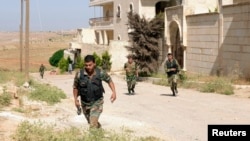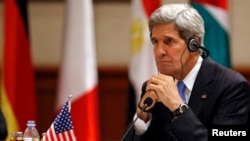BEIRUT —
Syrian government forces are moving into position to launch a major offensive on the rebel-held half of the country’s biggest city, Aleppo, according to opposition activists.
They say assault is likely to feature the deployment once again of thousands of guerrillas from Hezbollah, the militant Lebanese Shia movement that is backing President Bashar al-Assad’s Syrian regime.
Hezbollah fighters were the key factor in the Syrian government’s capture last week of Qusair, a strategic town near the border with Lebanon – a gain that has disrupted important rebel supply lines.
On Monday, Saudi Arabia and other pro-rebel Gulf nations condemned what they described as “Hezbollah’s blatant invention in the crisis in Syria.” In a joint statement, they said “Hezbollah’s illegal intervention and the horrific practices of its militias in the region will harm its interests.”
The statement was interpreted to mean that Saudi Arabia and its allies might implement financial and political sanctions against Hezbollah and its supporters. The statement also urged Lebanon to rein in Hezbollah, a move that could trigger another civil war in Lebanon.
According to Hezbollah’s own TV station, Al Manar, the planned assault on Aleppo has been dubbed “Northern Storm.”
Since the capture of Qusair, which had been under rebel control since last year, the Syrian government has been carrying out mopping up operations in surrounding villages. But it also has dispatched units, including Hezbollah fighters, to Aleppo.
Hard choices for Washington
The government-controlled al-Watan newspaper says the Syrian army is “deploying heavily in the countryside near Aleppo in preparation for a battle that will be fought inside the city and on its outskirts.” Opposition activists in Aleppo say they have seen reinforcements and that fighting has already intensified in some districts of Aleppo.
The launch of a major Syrian government offensive could increase the pressure on the Obama administration to speed up a decision on arming some rebel brigades. Up to now, the rebels, mainly Sunni Muslims, have been receiving weapons from the Gulf countries of Qatar and Saudi Arabia.
Last month, Britain and France persuaded their European Union allies to lift an embargo on arming the rebels, but both countries have so far refrained from doing so because of the ongoing effort to organize peace talks in Geneva.
U.S. Secretary of State John Kerry postponed a planned trip to the Mideast this week so he could join White House discussions on whether to arm rebel units, say U.S. officials. Syrian rebel leaders have been warning Washington since the fall of Qusair that they are facing irreversible setbacks in the war that has left an estimated 80,000 dead and displaced more than three million Syrians over the past two years.
Aleppo is key to Syria’s north
Syrian rebels have controlled slightly more than half of Aleppo city for a year. This, in turn, has allowed them to control most of Aleppo Province and the neighboring province of Idlib all the way to the Turkish border. Since the late autumn there has been little change in the frontlines in the city – both sides have managed little more than to hold their positions.
A European military attaché in Beirut tells VOA it will be much harder for the Assad government to push the rebels out of Aleppo, until recently a city of almost three-million residents, than it was capturing the much smaller town of Qusair.
“The rebels have strong supply lines running all the way to Aleppo from Turkey – the rebel enclave running north is their home territory,” the attaché said. “With Qusair, Hezbollah controlled much of the hinterland around.”
Rebel sources say they expect renewed air strikes on towns north of Aleppo aimed at disrupting their supply lines. They are strengthening their defenses to the south of the city in an attempt to block the government from sending armored columns into the city from the government-controlled town of Salamiyeh.
They say assault is likely to feature the deployment once again of thousands of guerrillas from Hezbollah, the militant Lebanese Shia movement that is backing President Bashar al-Assad’s Syrian regime.
Hezbollah fighters were the key factor in the Syrian government’s capture last week of Qusair, a strategic town near the border with Lebanon – a gain that has disrupted important rebel supply lines.
On Monday, Saudi Arabia and other pro-rebel Gulf nations condemned what they described as “Hezbollah’s blatant invention in the crisis in Syria.” In a joint statement, they said “Hezbollah’s illegal intervention and the horrific practices of its militias in the region will harm its interests.”
The statement was interpreted to mean that Saudi Arabia and its allies might implement financial and political sanctions against Hezbollah and its supporters. The statement also urged Lebanon to rein in Hezbollah, a move that could trigger another civil war in Lebanon.
According to Hezbollah’s own TV station, Al Manar, the planned assault on Aleppo has been dubbed “Northern Storm.”
Since the capture of Qusair, which had been under rebel control since last year, the Syrian government has been carrying out mopping up operations in surrounding villages. But it also has dispatched units, including Hezbollah fighters, to Aleppo.
Hard choices for Washington
The government-controlled al-Watan newspaper says the Syrian army is “deploying heavily in the countryside near Aleppo in preparation for a battle that will be fought inside the city and on its outskirts.” Opposition activists in Aleppo say they have seen reinforcements and that fighting has already intensified in some districts of Aleppo.
The launch of a major Syrian government offensive could increase the pressure on the Obama administration to speed up a decision on arming some rebel brigades. Up to now, the rebels, mainly Sunni Muslims, have been receiving weapons from the Gulf countries of Qatar and Saudi Arabia.
Last month, Britain and France persuaded their European Union allies to lift an embargo on arming the rebels, but both countries have so far refrained from doing so because of the ongoing effort to organize peace talks in Geneva.
U.S. Secretary of State John Kerry postponed a planned trip to the Mideast this week so he could join White House discussions on whether to arm rebel units, say U.S. officials. Syrian rebel leaders have been warning Washington since the fall of Qusair that they are facing irreversible setbacks in the war that has left an estimated 80,000 dead and displaced more than three million Syrians over the past two years.
Aleppo is key to Syria’s north
Syrian rebels have controlled slightly more than half of Aleppo city for a year. This, in turn, has allowed them to control most of Aleppo Province and the neighboring province of Idlib all the way to the Turkish border. Since the late autumn there has been little change in the frontlines in the city – both sides have managed little more than to hold their positions.
A European military attaché in Beirut tells VOA it will be much harder for the Assad government to push the rebels out of Aleppo, until recently a city of almost three-million residents, than it was capturing the much smaller town of Qusair.
“The rebels have strong supply lines running all the way to Aleppo from Turkey – the rebel enclave running north is their home territory,” the attaché said. “With Qusair, Hezbollah controlled much of the hinterland around.”
Rebel sources say they expect renewed air strikes on towns north of Aleppo aimed at disrupting their supply lines. They are strengthening their defenses to the south of the city in an attempt to block the government from sending armored columns into the city from the government-controlled town of Salamiyeh.





